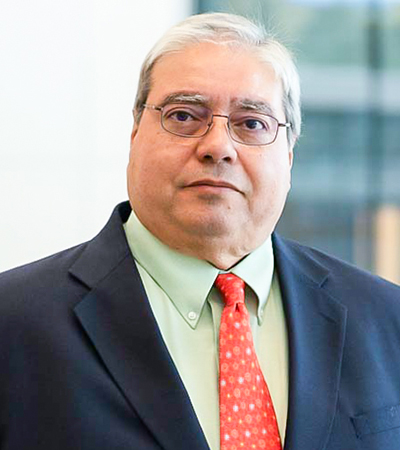 Julio Rivera, DBAJulio Rivera, DBA, who teaches a mix of face-to-face and online courses, said his teaching philosophy has evolved as a result of both experience and teaching-development opportunities during his 30-year tenure at UAB.
Julio Rivera, DBAJulio Rivera, DBA, who teaches a mix of face-to-face and online courses, said his teaching philosophy has evolved as a result of both experience and teaching-development opportunities during his 30-year tenure at UAB.
Preparing courses for online delivery results, for example, results in much better classroom courses because it “forces one to deliberately plan and produce content and activities in advance and then logically organize them in a progressive fashion,” Rivera says. “Regardless of the set of activities, it is important to surround students with the resources and support they need to be successful.”
These are among the reasons Rivera, associate professor in the Collat School of Business Department of Management, Information Systems and Quantitative Methods, is one of the 12 faculty selected to receive the 2019 President’s Award for Excellence in Teaching.
“Dr. Rivera has a tremendous ability to teach difficult technical material in a way that allows students to quickly access and understand it... His instruction was foundational to my success in the program.” |
Rivera's teaching spans managerial and technical fields with a focused attention on information security, mobile application development and IT strategy, and his research focuses on computermediated learning and information security. Among students, he is popular for teaching them to fix a problem and — more important —to recognize a problem and formulate their own solutions.
A recent graduate of UAB's MS-MIS program, who took five classes from Rivera across both the information security and web and mobile development tracks, wrote that “Rivera showed me that a masters-level program isn't just about learning facts and being able to repeat them, rather it is about approaching a problem analytically, objectively and applying those facts to develop a solution. As a result, he said the “vast breadth of knowledge” he gained “has made me a better security professional and has afforded me with a different approach and outlook to analyzing incidents.”
A 2018 graduate who first met Rivera as a student in the Bridge program, which helps students transition from a non-technical background into the MS MIS program, said “Dr. Rivera has a tremendous ability to teach difficult technical material in a way that allows students to quickly access and understand it. The foundation he built for me in my first semester served me well throughout my time at UAB, and his instruction was foundational to my success in the program.”
Later during one of the program’s “notoriously difficult” courses, Rivera “demonstrated a genuine commitment to helping students master the material by actively participating in our discussions, preparing lecture material that gave real world context and generously offering his time in weekly online study sessions,” the student wrote.
“His teaching style is interactive, multidisciplinary, challenging and fun.” |
Part of that success comes from the clear roadmap Rivera creates for his students. “I try to the extent possible to reduce the uncertainty students face when taking a class,” he said. “To do this, and to the extent possible, I develop all the assignments, quizzes, etc., before I start teaching the class. This allows me to create a schedule for the semester and give students a consistent plan of how the class will proceed.”
Student participation also is an integral part of Rivera’s instruction. “For the online classes, I require students to participate in an online discussion forum,” he said. “I monitor the forum and answer questions as necessary. I also seed the forums with questions intended to make students think and apply the material they are covering.” In the classroom, he often tries “to ask questions in class that bring the students’ experience to bear on the subject matter.”
A graduate student of Rivera’s who went on to pursue her doctorate, ranks him “in the top 1% of professors with whom I have had the pleasure of interacting.” Through her undergraduate studies, she had become “somewhat accustomed to the traditional lecture format.” But, she noted, Rivera used his class time less for lecture and more as a time for interaction and discussion, which she described as “refreshing.”
“His teaching style is interactive, multidisciplinary, challenging and fun,” she wrote. “Discussion within an online discussion board allowed for classroom discussion to continue outside of the typical classroom hours.”
The integration of teaching styles across both forums served Rivera and his students well when the novel coronavirus ended classroom instruction during the spring semester. He was teaching an online and a face-to-face section of the same class, and with minor adjustments he “simply picked up with the online version of the class for my face-to-face section” and expanded his Zoom-based office hours to include two more weekly sessions. “The one challenge that everyone faced was arranging proctoring for the final exam, since the online proctoring company was overwhelmed by demand for their services,” he said.
